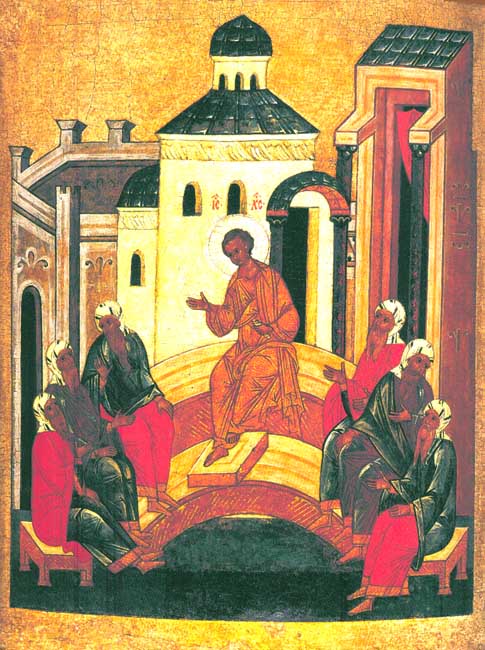لقد قلنا في البداية أيضاً أن عيد نصف الخمسين هو عيد حكمة الله الذي هو كلمة الله. وبدل أن نعالج النصوص التي تتكلّم عن المسيح كحكمة الله، علينا أن ننظر للحظة إلى كل الإشارة المعاصرة لموضوع الصوفيولوجي (علم الحكمة). يتكلّم الكتاب المقدّس، بعهديه القديم والجديد، عن حكمة الله. بعض المفكرين الروس الشباب، في محاولة لتفسير هذه النصوص، عزوا إلى الحكمة (Sophia) صفة غنوصية، ويمكن القول بأنها من مدرسة القول بوحدة الوجود (pantheistic). بولغاكوف هو مَن قام بأهم اجتهاد في هذه النظريات واستعمل نوعاً من اللغة الفلسفية-اللاهوتية والغنوصية. لم يماهِ الحكمة بالمسيح بل ماهاها بجوهر الله بشكل أساسي. فهو رأى أنّ الحكمة هي فكرة الله، اسم الله، المحبة، الأنثوية الخالدة… تماماً مثما تكلّم الصوفيولوجيون قبله. وفي كلامه بطريقة مجرّدة عن حكمة الله، اتُّهِم بأنّه يضيف شخصاً رابعاً إلى الثالوث القدوس، أي أنّه يضيف إلى الإله الثالوثي (الآب والابن والروح القدس) شخصاً رابعاً هو حكمة الله. إلى هذا، فالصوفيولوجيون السابقون، الذين تأثّر بهم، كانوا يصفون حكمة الله بطريقة شاعرية مثل “أنثى فائقة الجمال، محبة خالدة”… في ردّه على هذه التهمة ميّز بولغاكوف بين الأقنوم والصفة الأقنومية التي تشير إلى حكمة الله. وفي هذا أيضاً ارتكب خطأً كبيراً أيضاً.
في نظام بولغاكوف الصوفيولوجي، تتماهى حكمة الله أحياناً مع الله، أحياناً أخرى مع العلم، وأحياناً هي كائن وسيط بين الله والعالم. هذا يظهر مدى غياب الثقة في هذه الآراء. عندما تتماهى الحكمة مع العالم، يكون عندنا نوع من وحدة الوجود، وعندما تكون كائناً وسيطاً بين الله والعالم، يكون عندنا غنوصية، كونها تقود إلى نظرية خلق العالم من خلال دفق من الآلهة الوسيطة الصغيرة، ومن بينها كلمة الله.
لقد أدان سرجيوس بطريرك موسكو، ومعه مجمع الأساقفة الروسي، هذه الاراء. لا يمكن لهذه النظرية أن تقوم لأن كلمة “حكمة” إذا لم تُشِر إلى الفكر والتمييز وغيرها، فهي تُنسَب إلى ابن الله وكلمته، الذي هو الحكمة متشخصنة. إذاً إنها أقنوم محدّد يتوسّط بين الله والكون، وليست حالة مجردة، بل هي ابن الله وكلمته. إن حكمة الله هي أقنوم، إنها الشخص الثاني من الثالوث القدوس.


